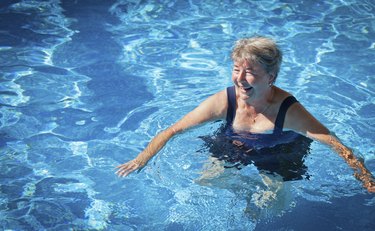
When the electrical signals that keep the heart pumping at a normal rate become compromised, abnormalities in your heart rate result, and a pacemaker may be needed to correct the problem. A pacemaker is often used to treat slow heart rate, sending an electrical impulse to your heart to stimulate contraction and keep your heart rate in the normal range. Being fitted with a pacemaker does not preclude your participating in exercises, but there are a few restrictions that apply to swimmers, both immediately after having the pacemaker put in and in long-term.
The First Six Weeks
Video of the Day
According to the Cleveland Clinic, after you are fitted with a pacemaker, your surgical site needs to be kept clean and dry, with a shower being allowed five days post-surgery. For the six weeks immediately after the implantation, you should not lift anything weighing more than 10 lbs. You might not be able to enter or exit a pool without placing a dangerous amount of weight on your arms. The Cleveland Clinic recommends avoiding swimming during the six weeks immediately following your surgery.
Video of the Day
The First Three Months
During the first three months after you have a pacemaker implanted, you should not engage in any activity that will stress the implantation site. This includes exercises that require stretching your arm over your head, which means some swim strokes are prohibited. After this three month period, only swim strokes that could damage the pacemaker are prohibited, such as the butterfly stroke.
Swimmers Living With a Pacemaker
While most swim strokes will be acceptable after a suitable recovery period, the butterfly stroke could potentially damage your pacemaker wires. The motion involved in this stroke may cause what is known as a "clavicular pinch," where the wires of the pacemaker are compressed between your rib and collarbone. The life of your pacemaker battery will depend on your level of activity, and if you are a strong swimmer who puts in a lot of pool time, you may need to get your pacemaker checked more regularly to determine battery life.
Consideration
Swimmers should start slowly and increase exercise intensity gradually. Many pacemakers can adjust heart rate to accommodate intense physical activity, but your device could also need to be adjusted by your health care professional. Follow your doctor's advice as you ease back into your swimming routine after getting your pacemaker.